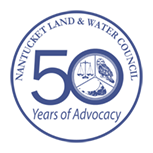The NLWC’s primary source of funding comes from our membership base.
Every donation we receive is used to accomplish our mission of protecting
Nantucket’s land and water resources and preserving the island’s rural
character.
We can’t do this work without your generous support. Members receive acknowledgment in our annual report, eNews, and on our website; bi-annual newsletters and our Annual Report, as well as invitations to upcoming special events and educational field trips and tours. Click HERE for detailed information on MEMBERSHIP LEVELS AND BENEFITS. To read NLWC’s Please Click HERE to DONATE.
To Read NLWC’s Donor Privacy Policy click HERE.
NLWC Impacts
Over the years, the NLWC has advocated to protect our precious drinking and saltwater resources from numerous threats posed by inappropriate development proposals, both industrial/commercial and private residential.
The NLWC has helped to protect some of Nantucket’s most important habitats, including sandplain grasslands and coastal heathlands – two globally rare habitats that are home to a number of rare and endangered species. We attend public meetings and hearings for local regulatory bodies commenting on inappropriate development projects, litigating when necessary. We advocate for improved policies and regulations to help protect our environmental health and resources in order to sustain a healthy island for our community. We actively protect over 1500 acres of land through our Conservation Restriction program.
NLWC by the Numbers…
20+ – average annual water quality sampling occasions on island ponds
93 – individual Conservation Restrictions held
200+ – average annual number of students impacted by our Karen K. Borchert educational grant program
250+ – number of private wells tested for PFAS contamination using the new PIGE “total organic fluorine” method
500+ – average hours annually spent reviewing proposals, writing letters, and commenting publicly
2500+ – acres of land protected on Nantucket, Tuckernuck, and Muskeget
20,000+ – number of healthy eelgrass shoots transplanted to vital parts of our harbor thus far
800,000+ – number of eelgrass seeds processed in 2024 alone
